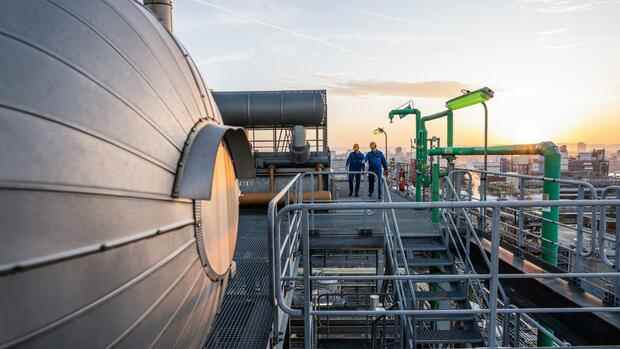Dusseldorf The war in Ukraine led to a sudden change of mood in the German chemical industry. Just a few weeks ago, the industry was expecting further growth this year. But now more than half of the companies expect a decline in production and sales. This is shown by a survey presented on Thursday by the industry association VCI among its member companies.
After that, the situation changed dramatically for energy- and raw material-intensive chemistry due to the Ukraine war. Oil and natural gas prices have risen sharply. The financial scope of companies is shrinking more and more.
70 percent of the companies are already reporting serious problems for their business due to the high prices – above all due to the expensive natural gas, which is the most important energy supplier for the operation of the chemical plants. 85 percent state that they are either unable or only partially able to pass on rising production and procurement costs to customers.
The entire industry is struggling with rising energy costs, albeit to varying degrees. Even before the massive increase, corporations such as Evonik secured the required gas quantities at fixed prices through long-term supply contracts.
Top jobs of the day
Find the best jobs now and
be notified by email.
Other companies have hesitated, expecting gas prices to fall again this year. They are now heavily burdened – as are chemical companies, which, in addition to long-term supply contracts, buy gas quantities depending on the market demand.
The threatening and uncertain situation has led to a novelty at the VCI: the association is not giving a forecast for developments this year. The previous assessment, which provided for a five percent increase in sales, was withdrawn. “Any forecast would be highly speculative,” said VCI Managing Director Wolfgang Große Entrup.
If chemistry suffers, a number of other sectors suffer
A possible embargo on Russian raw material supplies would affect the industry in different ways. Oil is the most important raw material for chemistry. The chemical industry could probably still put up with the failure of the supplier Russia – the VCI does not assume that this would lead to production being cut back or even stopped.
A good third of oil imports in Germany come from Russian sources. This could be replaced as oil is basically available on the world market from many regions. In addition, the supply by ship or pipeline for the refineries is secured. However, oil prices are likely to rise significantly – and with them end consumer prices.
On the other hand, stopping the import of Russian natural gas would have massive consequences for the chemical-pharmaceutical industry. “Deep cuts in the production level of the industry would not only be expected in large energy-intensive companies, but also inevitable in medium-sized companies and probably across all sectors,” explained Große Entrup.
The effects would not be limited to chemistry. The sector is a supplier of raw materials for almost all processing industries. A failure would affect the agriculture, food, automotive, cosmetics, construction, packaging, pharmaceuticals or electronics sectors via the value chains.
The VCI survey shows that many chemical companies are already finding it difficult to pass on the high energy and raw material prices to their customers. Large companies such as Lanxess and Covestro have recently expressed confidence that they will continue to do so. Overall, however, this depends on factors such as contractual clauses with customers and the competitive situation.
The plastics manufacturer Covestro, for example, was practically sold out at the beginning of this year. The Leverkusen-based company benefits from the fact that the supply situation in the markets for polyurethane foams and polycarbonate plastics remains tight worldwide. This brings a certain power in the price negotiations. “We are assuming that we will be able to pass on the higher costs to customers again this year,” says Covestro CFO Thomas Töpfer.
BASF will also try to pass on the burden of expensive oil and gas by increasing prices. At an analysts’ conference, however, BASF CEO Martin Brudermüller emphasized that this is no longer as easy as it was last year. “We are already at a very high price level throughout the portfolio,” he said, adding: “With every step higher in prices, customer resistance is growing.
Chemical industry fears “severe and multi-year recession” from natural gas embargo
This is much more problematic for medium-sized chemical companies. They do not produce at locations in Asia or the USA, where electricity and energy are less expensive, but are dependent on the gas supply here in Germany. In addition, you compete internationally with chemical companies in countries where electricity and gas are cheaper than in Germany anyway. This severely limits the ability of customers to adjust prices.
In the event of an embargo on Russian natural gas, the VCI expects a “severe and multi-year recession with massive job losses”. Unlike in the financial and corona crisis, this would not be a state of shock, but the economic performance of German industry would be at stake.
>> Read about this: No gas embargo: the chemical industry supports Habeck’s course
The industry is already demanding a reaction from politicians. From the point of view of the VCI, all timely solutions that support the security of supply and affordability of energy should have priority, such as the timely abolition of the EEG surcharge, a reduction in energy tax to the EU minimum or a temporary suspension of the phase-out of coal-fired power generation.
At the same time, the expansion of renewable energies and the necessary infrastructure must be pushed forward with all our might – even against resistance. The acceleration of planning and approval procedures must be given “outstanding importance”. For the VCI, the project of the EU chemicals strategy with the extensive new regulation belongs to the category “postponement”.
More: Fertilizer manufacturers are curbing production: there is a risk of crop losses worldwide
